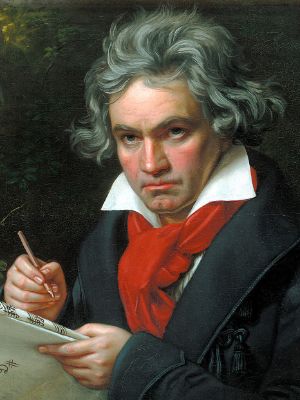

Ludwig van Beethoven. Portrait by Joseph Karl Stieler, 1820 ©_Beethoven-Haus, Bonn / Wikimedia Commons
Ludwig van Beethoven
There is no easy access to the biography of Ludwig van Beethhoven (1770-1827). Far too many clichéd ideas have clouded our image of the composer, too many legends have been created and there are too many, partly ludicrous, hypotheses and assumptions about the conditions of his life as well as too many open, apparently unanswerable questions – for example, concerning the identity of his “Immortal Beloved”. At the same time, there is a crushing amount of biographical material – the analysis of Beethoven’s letters alone is a special branch of imposing complexity – so that complaints about the difficulty of writing a Beethoven-biography are a musicological commonplace. And yet, the established external facts about his life are scarce. Beethoven was born on 16 or 17 December 1770 in Bonn, as the son of a humble musician. His living conditions were of a kind that we would describe as precarious today. After initially being taught by his father, who tried to mould his son into a wunderkind like Mozart, Kapellmeister Christian Gottlob Neefe, Kapellmeister in Bonn, took over Beethoven’s musical education. The boy developed at such a rapid pace that he was employed by the Bonn Court Orchestra from 1782. In 1787, the adolescent Beethoven was sent to Vienna to study with Mozart. These studies, however, had to be abandoned after only two weeks, because Beethoven’s mother fell gravely ill. She died no more than a few weeks after his return. His father was completely overcome by his alcohol addiction and Beethoven took charge of the family.
Equipped with a grant from the Elector, Beethoven traveled to Vienna once more in 1792, where he was taught for just over a year by Joseph Haydn, until the latter set out for his second journey to London. Following the French occupation of Bonn in 1794, the Elector’s financial support ceased. From this time, Beethoven lived the life of a free-lance musician in Vienna. He was cordially welcomed by the city’s music-loving aristocracy, and for the rest of his life, he maintained friendly relations with many members of those circles, overcoming all boundaries of rank. Beethoven initially made a name for himself as a pianist and improviser, but he soon began to steadily publish new compositions. The year 1803 saw the beginning of a central period of creation during which he composed an incomprehensible abundance of the masterpieces that we have come to associate with his name above all others, such as his Third (Eroica) to Eighth Symphonies. Beethoven was now regarded undisputedly as the most eminent composer of his time.
Around the late 1790s, Beethoven had first become aware of a hearing defect which was to progress inexorably, causing complete deafness by 1820. Increasingly isolated from his surroundings, Beethoven developed traits of an eccentric. His life was further soured by the constant need to haggle with his publishers and by his chronically poor health. From the year1815, there was an additional worry about his nephew, for whose education he felt responsible after the death of his brother. And yet, during the last decade of his life, he composed a refined late oeuvre that counts among the absolute highlights in the history of music. Beethoven died on 26 March 1827.
There is no easy access to the biography of Ludwig van Beethhoven (1770-1827). Far too many clichéd ideas have clouded our image of the composer, too many legends have been created and there are too many, partly ludicrous, hypotheses and assumptions about the conditions of his life as well as too many open, apparently unanswerable questions – for example, concerning the identity of his “Immortal Beloved”. At the same time, there is a crushing amount of biographical material – the analysis of Beethoven’s letters alone is a special branch of imposing complexity – so that complaints about the difficulty of writing a Beethoven-biography are a musicological commonplace. And yet, the established external facts about his life are scarce. Beethoven was born on 16 or 17 December 1770 in Bonn, as the son of a humble musician. His living conditions were of a kind that we would describe as precarious today. After initially being taught by his father, who tried to mould his son into a wunderkind like Mozart, Kapellmeister Christian Gottlob Neefe, Kapellmeister in Bonn, took over Beethoven’s musical education. The boy developed at such a rapid pace that he was employed by the Bonn Court Orchestra from 1782. In 1787, the adolescent Beethoven was sent to Vienna to study with Mozart. These studies, however, had to be abandoned after only two weeks, because Beethoven’s mother fell gravely ill. She died no more than a few weeks after his return. His father was completely overcome by his alcohol addiction and Beethoven took charge of the family.
Equipped with a grant from the Elector, Beethoven traveled to Vienna once more in 1792, where he was taught for just over a year by Joseph Haydn, until the latter set out for his second journey to London. Following the French occupation of Bonn in 1794, the Elector’s financial support ceased. From this time, Beethoven lived the life of a free-lance musician in Vienna. He was cordially welcomed by the city’s music-loving aristocracy, and for the rest of his life, he maintained friendly relations with many members of those circles, overcoming all boundaries of rank. Beethoven initially made a name for himself as a pianist and improviser, but he soon began to steadily publish new compositions. The year 1803 saw the beginning of a central period of creation during which he composed an incomprehensible abundance of the masterpieces that we have come to associate with his name above all others, such as his Third (Eroica) to Eighth Symphonies. Beethoven was now regarded undisputedly as the most eminent composer of his time.
Around the late 1790s, Beethoven had first become aware of a hearing defect which was to progress inexorably, causing complete deafness by 1820. Increasingly isolated from his surroundings, Beethoven developed traits of an eccentric. His life was further soured by the constant need to haggle with his publishers and by his chronically poor health. From the year1815, there was an additional worry about his nephew, for whose education he felt responsible after the death of his brother. And yet, during the last decade of his life, he composed a refined late oeuvre that counts among the absolute highlights in the history of music. Beethoven died on 26 March 1827.
As of June 2019
